Key takeaways:
- Cultural perspectives significantly influence notions of justice, emphasizing healing and community welfare over punishment in various societies.
- The anti-death penalty movement highlights moral concerns about wrongful convictions and the need for a justice system that reflects diverse cultural beliefs.
- Experiences of justice disparities reveal that economic status and cultural biases create inequities within legal outcomes, challenging the idea of blind justice.
- Advocating for justice reform requires integrating cultural understanding into policies and practices, promoting empathy and equitable treatment in law enforcement.
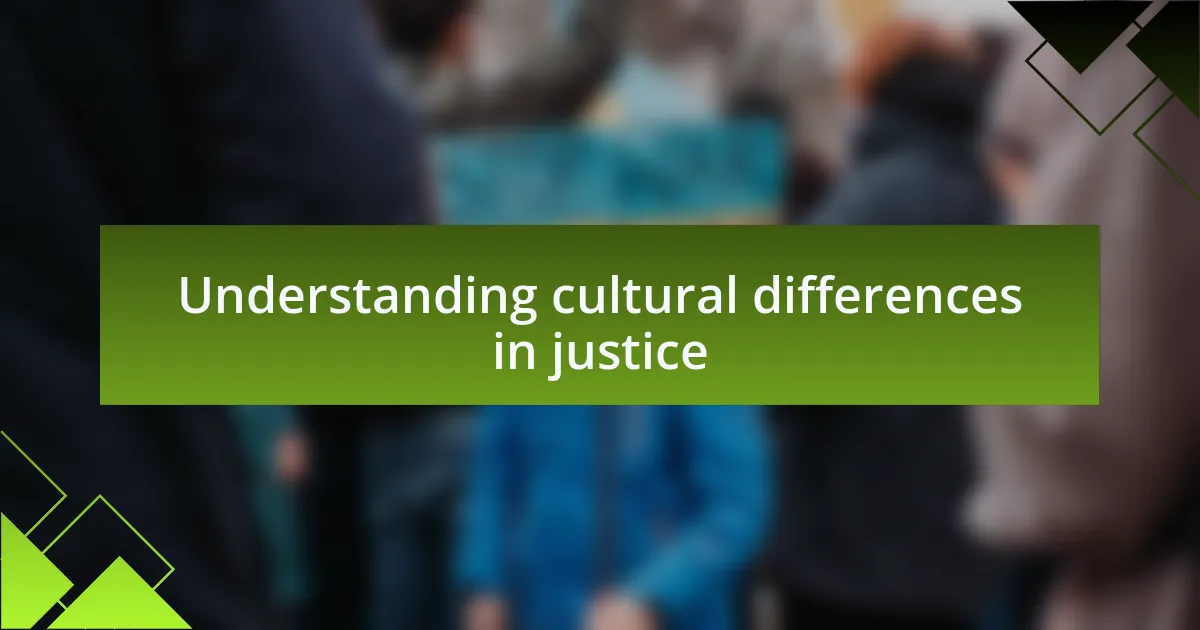
Understanding cultural differences in justice
Cultural differences in justice often shape how societies perceive crime and punishment. For example, during my time studying various legal systems, I was struck by how restorative justice models in some Indigenous communities focus on healing rather than retribution. It made me wonder—can true justice exist if it does not account for the unique values and traditions of a culture?
In certain cultures, collective responsibility takes precedence over individual punishment, challenging my preconceived notions about justice. I remember a fascinating discussion with a colleague from Japan, who explained how their approach often emphasizes harmony and restitution, rather than simply isolating the offender. This perspective opened my eyes to the idea that justice could be seen as a path towards communal healing rather than merely a punitive measure.
As I’ve explored different judicial philosophies, I’ve often questioned how our backgrounds inform our beliefs about justice. For instance, in some Western societies, there is a strong emphasis on individual rights, which can sometimes overshadow the notion of community welfare. This realization has led me to reflect deeply on my own biases and how they shape my understanding of what justice should look like in a global context.
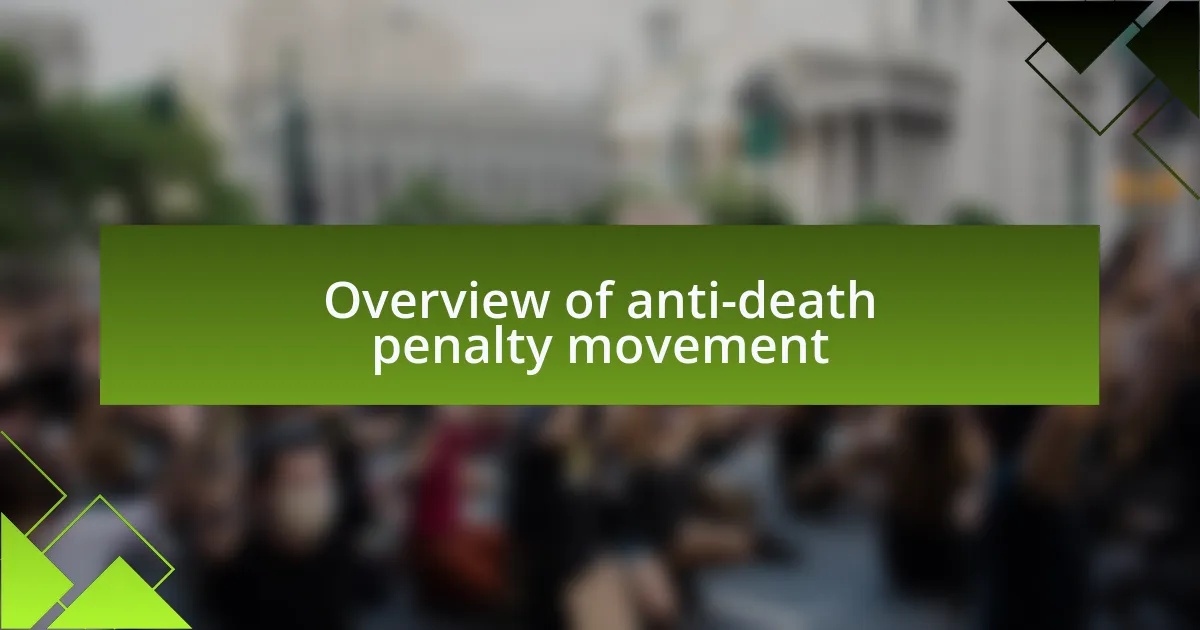
Overview of anti-death penalty movement
The anti-death penalty movement has evolved significantly over the years, driven by a growing awareness of the moral and practical implications of capital punishment. I remember attending a discussion where passionate advocates shared their stories, highlighting cases of wrongful convictions. Each story struck a chord with me, revealing how the irreversible nature of the death penalty raises questions about our justice system’s reliability.
Grassroots organizations have played a vital role in the movement, mobilizing public opinion and influencing policy changes. I often found myself inspired by the individuals who dedicated their lives to this cause, bravely confronting the notion of justice that so many take for granted. One conversation with a former death row inmate left me pondering: how many lives must be altered before we reconsider the ethics of executing individuals for their alleged crimes?
As the movement gains momentum, more diverse voices contribute to the discourse surrounding capital punishment. I’ve noticed that people from various cultural backgrounds bring unique perspectives to this issue, enriching the conversation. This realization led me to ask, how can understanding different beliefs about justice strengthen our collective efforts to abolish the death penalty? For me, engaging with these diverse viewpoints is not just enlightening; it fosters a deeper commitment to advocating for a more just and humane system.
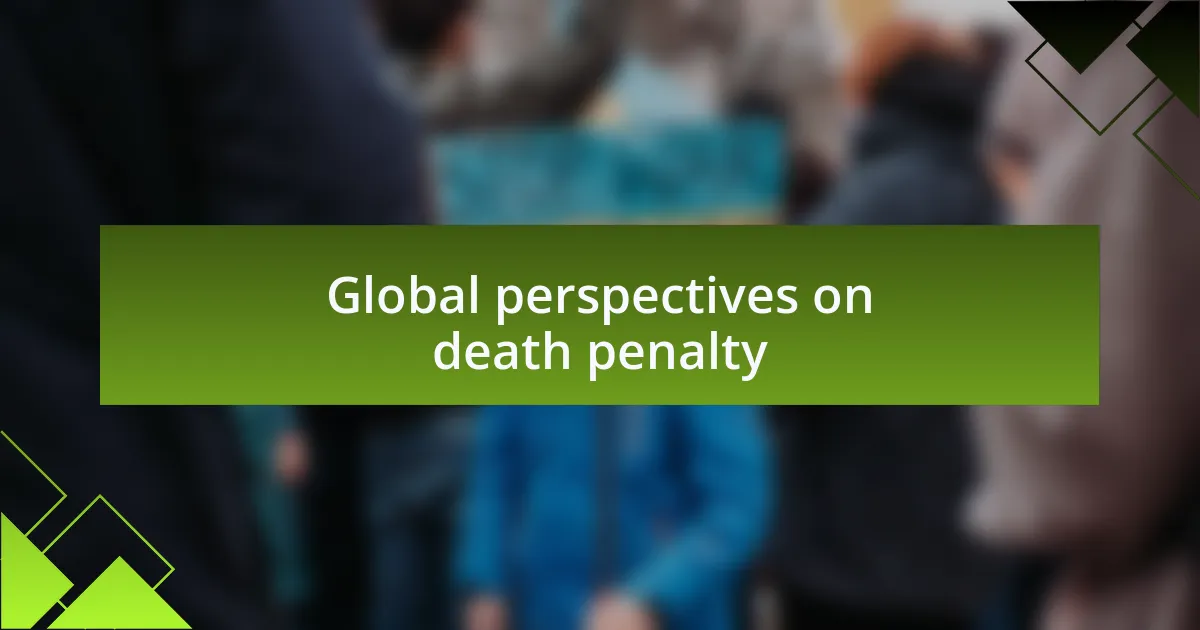
Global perspectives on death penalty
When reflecting on global perspectives on the death penalty, I am struck by the stark contrasts among different cultures. For instance, I once spoke with a friend from a country where capital punishment is deeply entrenched in the legal system. Her unwavering belief in its necessity for maintaining order left me questioning how we define justice across different societies. It made me realize just how much cultural values shape our views on life and death.
Conversely, I recall attending a seminar featuring speakers from nations where the death penalty has been abolished. Their arguments resonated with me, emphasizing rehabilitation over retribution. They argued passionately that true justice should focus on healing rather than punishment. It led me to ponder, should our shared humanity compel us to find alternatives to capital punishment that transcend our individual beliefs?
In my experience, engaging with these diverse perspectives brings both frustration and hope. While it’s challenging to reconcile the stark differences in attitudes toward justice, I often find that open discussions can bridge those divides. How do we find common ground in this seemingly polarized issue? I believe it starts with empathy—listening to others’ experiences can inspire us to reconsider our own positions and perhaps unite in the pursuit of a fairer justice system for everyone.
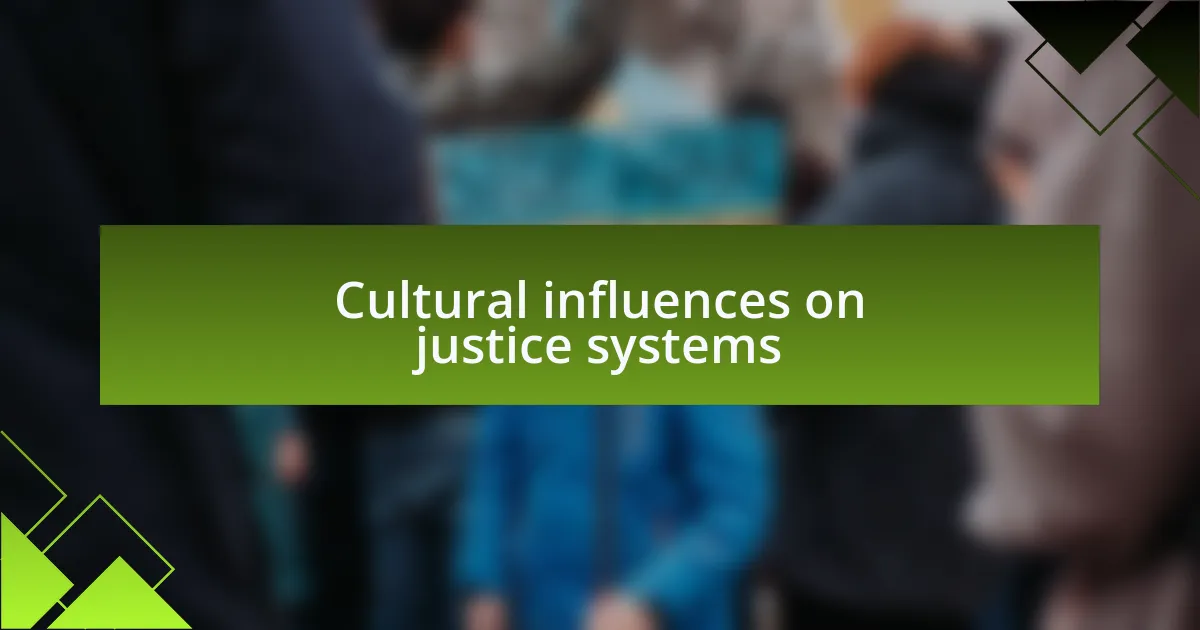
Cultural influences on justice systems
Cultural influences on justice systems are fascinating in how they reflect the values and beliefs of a society. For example, during a visit to Japan, I noticed how their emphasis on harmony and community significantly impacts their justice practices. In conversations with locals, it became clear that restorative justice plays a vital role, with a focus on repairing relationships rather than punishing offenders. This made me consider how our own cultural backgrounds shape our perceptions of right and wrong.
In contrast, I remember grappling with discussions in a Western context, where individual rights often take precedence. I encountered a legal expert who emphasized the idea of punishment as a deterrent, rooted in a culture that values personal responsibility. This difference led me to question: what happens to the collective sense of community when we prioritize punitive measures over understanding and reconciliation?
Reflecting on these experiences, I cannot help but wonder how much our cultural narratives influence our justice systems. When I discuss these matters with friends from diverse backgrounds, their stories reveal the emotional depth that often goes unnoticed. How do the stories of a society inform its rules? I find that engaging with such questions can spark profound dialogue about justice that transcends borders, encouraging us to rethink our own assumptions.
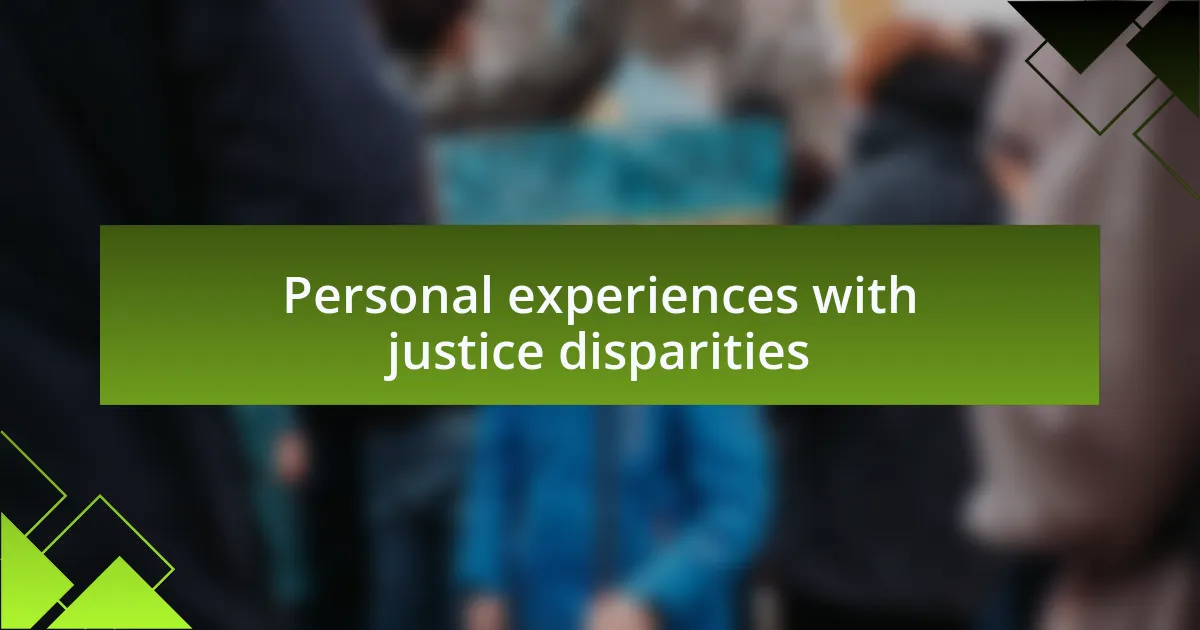
Personal experiences with justice disparities
In my journey advocating for justice reform, I’ve encountered stark disparities that often leave me questioning the fairness of our systems. For instance, I once volunteered with a legal aid organization that served low-income communities. I was struck by how often individuals with fewer resources faced harsher sentences compared to those who could afford high-priced lawyers, prompting me to wonder: do we really believe that justice is blind when economic status looms so large?
I distinctly remember a case that involved a young man from a marginalized community. Despite being a first-time offender for a non-violent crime, he received a sentence that seemed excessive compared to a wealthy peer caught in similar circumstances but treated with leniency. The emotional weight of witnessing such injustices compelled me to reflect on how deeply cultural biases can seep into the judicial process. Shouldn’t our systems reflect equality rather than perpetuate existing disparities?
These experiences resonate deeply with me, igniting a passion to raise awareness about justice disparities. I often deliberate with colleagues about the concept of a fair trial—what does that even mean when the scales are tipped from the very beginning? Sharing these stories has reinforced my belief that unless we confront these inequities head-on, we hinder the possibility of fostering a truly just society for all.
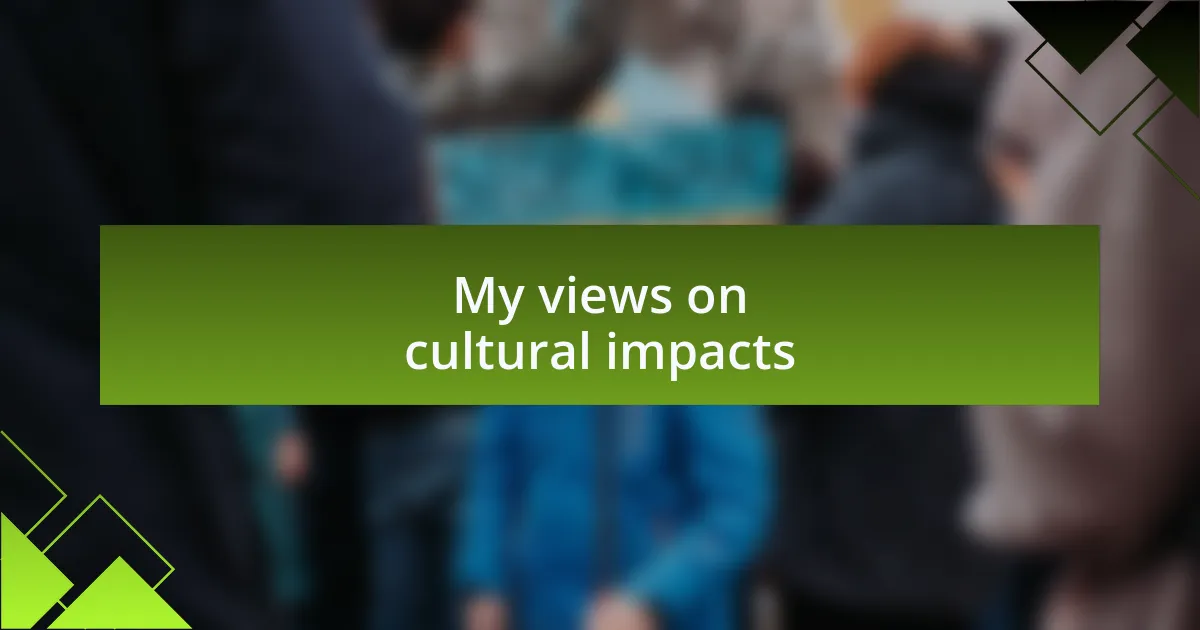
My views on cultural impacts
When I consider the cultural impacts on our justice system, it often feels like a complex tapestry of beliefs and biases. For example, during one community meeting, I listened to a woman passionately share how cultural norms shaped her perception of legal authority. Her experience highlighted how different communities can view justice not just through the lens of law, but through their cultural values and historical contexts.
I remember a discussion with a close friend from a different background who remarked that, in their culture, seeking forgiveness and reconciliation is prioritized over punishment. This perspective has challenged my thinking on justice. Can we truly claim to administer justice when cultural values influence outcomes so significantly? The deeper I dive into these discussions, the clearer it becomes: our understanding of what is “just” is often rooted in cultural narratives that vary widely.
One moment that lingers in my mind involved a workshop on restorative justice. Participants shared stories illustrating how their cultural backgrounds shaped their approaches to conflict resolution. Hearing these diverse perspectives reinforced my belief that cultural context is vital in shaping effective justice policies. How can we hope to achieve true justice if we fail to consider the rich variety of perspectives shaped by culture?
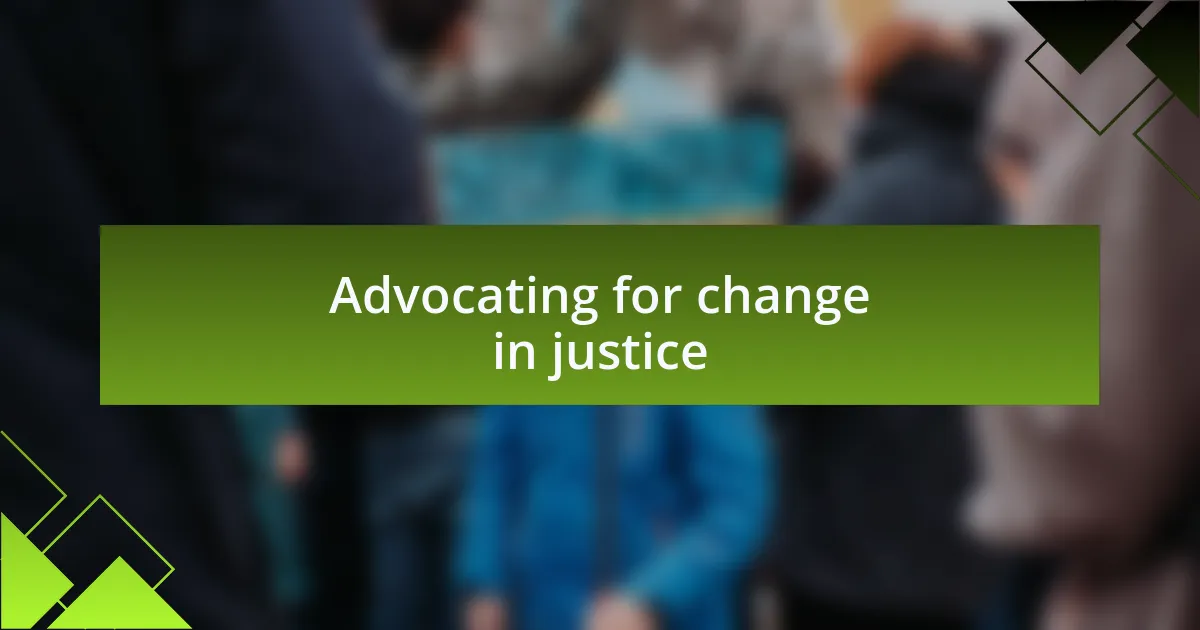
Advocating for change in justice
When advocating for change in justice, I often reflect on my encounters with firsthand stories of those affected by harsh sentencing laws. A colleague shared her brother’s experience with a justice system that seemed to overlook the nuances of his upbringing. This made me wonder: how many lives could be transformed if we embraced more compassionate and culturally informed approaches?
In one community forum, I witnessed people come together to demand reforms. Their practical passion for fairness was palpable. It’s moments like these that remind me how urgent it is to reshape our justice system; could modifying our policies based on cultural understanding lead to fewer errors and more equitable treatment?
I recall reading about a program focused on integrating cultural competency into law enforcement training. The positive impacts were apparent—officers were more empathetic and engaged with the communities they served. This experience left me pondering: isn’t it time we prioritized such approaches on a wider scale? After all, true change requires us to listen and adapt, ensuring justice is not just an abstract idea, but a tangible reality for everyone.